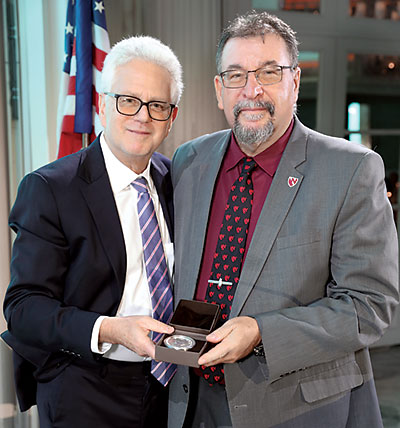Special Olympics International Receives 2023 Pardes Prize
Abstract
This year’s humanitarian award from the Brain & Behavior Research Foundation recognized Special Olympics International for its work with people with intellectual disability disorders, which goes far beyond sports training and competition.

While accepting the 2023 Pardes Humanitarian Prize on behalf of the Special Olympics International, Karoly Mirnics, M.D., Ph.D., a member of Special Olympics’ Board of Directors, noted the striking parallels between his organization and the Brain & Behavior Research Foundation (BBRF).
Both Special Olympics International and BBRF “grew out of nothing to the place we are at today” and continue to make a “tremendous impact on [people’s] daily lives,” he said. Mirnics is also the Hattie B. Munroe Professor of Psychiatry, Biochemistry & Molecular Biology at the University of Nebraska Medical Center and director of the school’s Munroe-Meyer Institute.
When Special Olympics launched in the early 1960s, it was just one summer camp for children with special needs located in the suburbs of Washington, D.C. Today, the nonprofit is the largest sports organization for people with intellectual and developmental disabilities (IDD), supporting over 5 million athletes across the globe. BBRF grew from a modest philanthropy known as the National Association for Research on Schizophrenia & Depression (NARSAD) to the largest nongovernmental funder of mental health research grants in the world. Since 1987, BBRF has awarded over $450 million to fund more than 6,500 grants to 5,400 scientists around the world.

Karoly Mirnics, M.D., Ph.D. (right), accepts the 2023 Pardes Humanitarian Prize on behalf of Special Olympics International from BBRF President Jeffrey Borenstein, M.D.
The success of Special Olympics and BBRF was made possible thanks to the determination of visionary women who wanted to raise awareness about people with mental illness and intellectual disability and reduce the stigma they and their families faced. For BBRF, the catalyst was Constance Lieber, who was president of BBRF from 1989 to 2007; for Special Olympics, it was Eunice Kennedy Shriver, who organized and hosted that first summer camp on her farm.
“Special Olympics International is a leading advocate for the inclusion of people with disabilities and a powerful force for reducing stigma and raising awareness of the mental health needs of people with intellectual disabilities,” said Jeffrey Borenstein, M.D., president and CEO of BBRF, when presenting the award. He also recognized Mirnics as one of the foremost research experts and advocates for people with intellectual and developmental disabilities worldwide.
The Pardes Humanitarian Prize, which has been awarded annually by BBRF since 2014, recognizes an individual or organization whose work has helped advance understanding of mental illness and made a profound impact on the lives of people with mental illness. The award is named after Herbert Pardes, M.D., the first recipient of the award and a past president of APA.
More Than Sports and Games
While many people might know of the role of Special Olympics in promoting physical activity for people with IDD, Mirnics noted the expansion of the nonprofit into other areas over the years. “As we grew, we realized that our athletes had many unmet medical needs,” he said during his speech. These issues included tooth decay, vision and hearing problems, elevated obesity rates, and communication difficulties.
Honorary Pardes Prize Recognizes Importance of Scientific Freedom
In addition to Special Olympics International, BBRF recognized psychiatrist and philanthropist Henry Jarecki, M.D., with an honorary Pardes Humanitarian Prize for his commitment to social justice and his efforts to preserve academic and scientific freedom.
Jarecki grew up in a German Jewish family that fled Nazism and eventually found its way to the United States. He started his career as a psychiatrist at Yale and was an early proponent of psychopharmacology. During his acceptance speech, he noted the challenges that he and other psychiatrists faced in the years after the first psychotropics were developed: “We were called pill pushers for daring to consider the chemistry that underlies psychiatric problems.”
He eventually left medical practice and became a successful businessman but continued to stay close to the field through investments in research and humanitarian efforts. As he noted, “priests and psychiatrists can never fully layoff their robes.”
A prime example highlighted by BBRF was the Scholar Rescue Fund, which he established in 2002. This program identifies scholars and scientists whose personal background and/or their scientific activities have led to government reprisal in their home country; the Rescue Fund relocates these individuals to safe settings where they can continue their important work.
“Imagine having dental pain and not being able to communicate that effectively,” Mirnics said. He noted such issues can manifest as behavioral problems.
In 1997, Special Olympics launched a vision and dental screening program for their athletes, which has since grown to include preventive health screenings. Mirnics highlighted some recent data that showcased the success of these screenings: Special Olympics athletes are about half as likely to be diagnosed with depression or anxiety, have 30% fewer health care visits per year, and cost Medicaid three times less than people with IDD who do not participate in Special Olympics.
The improvements in depression and anxiety may be attributable to the Strong Minds program; initiated in 2010, this preventive tool combines an emotional well-being assessment along with a learning activity that helps people with IDD develop adaptive coping strategies to manage stress.
“There is a big overlap in our patient populations,” Mirnics said. He noted that over 30% of people with IDD have one or more co-occurring psychiatric disorders, yet many go undiagnosed due to a lack of screening tools tailored to people with IDD and/or adequately trained physicians.
Mirnics said that Special Olympics plans on using the $150,000 honorarium accompanying the Pardes Prize to update the Strong Minds assessment to include more questions from validated health screens such as the CORE-LD30 (which assesses psychological distress in people with IDD). He noted that Special Olympics would also like to use the funds to incorporate this behavioral health assessment into athletes’ electronic health records to help facilitate a pathway to care for any athletes who screen positive.
“There is still much to be done, and the road behind is always shorter than the road ahead,” Mirnics said. But he did take a moment to reflect on Special Olympics’ latest World Games held in Berlin last June.
“Seeing 70,000 people cheer our athletes in the same stadium where Hitler refused to shake the hand of Jesse Owens is a testament to the progress we have made.” ■



